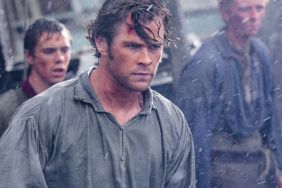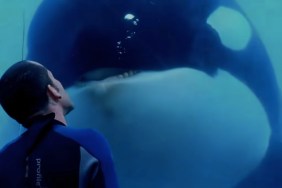
6 out of 10
Cast:
Chris Hemsworth as Owen Chase
Benjamin Walker as Captain George Pollard, Jr.
Cillian Murphy as Matthew Joy
Tom Holland as young Thomas Nickerson
Ben Whishaw as Herman Melville
Brendan Gleeson as old Thomas Nickerson
Michelle Fairley as Mrs. Nickerson
Gary Beadle as William Bond
Frank Dillane as Owen Coffin
Charlotte Riley as Peggy Gardner Owen
Donald Sumpter as Pal Macy
Jamie Sives as Isaac Cole
Directed by Ron Howard
In the Heart of the Sea Review:
There are three great classic conflicts and I would lay odds that man versus nature is the oldest as the wild would have been the major danger early man would have known. Interpersonal conflicts are the domain of civilization. During the 19th century, amid the rise of naturalism in fiction, it became the domain of most literature as well, such as the very famous story of a whaling ship, which was attacked and destroyed by a monstrous white whale and the poor decisions of her captain as told by a surviving young deckhand (Holland).
This was of course the story of the Essex, a Nantucket whaler which was destroyed off the coast of South America in a vain quest for whale oil, leaving behind only eight survivors. It became more famous still, as a story and as an exploration of those self-same classic conflicts, when a young Herman Melville (Whishaw) sought out the survivor as an old man (Gleeson) to add his story to Melville’s own experiences as sailor as part of a new book he was writing.
What Melville soon realized, and many others after him have too, is that the sheer ubiquity of this archetypal matchup makes finding new approaches and entrances to it difficult. In the modern sense, this has meant morphing the meaning of battling nature in Melville’s time – a fight to claim our rightful mastery over the world – with the idea of facing the consequences for having done so.
Certainly that is the task writer Charles Leavitt (Blood Diamond) chose in his adaptation of In the Heart of the Sea, layering the underlying tension between Essex’s seasoned first mate (Hemsworth) and its freshly-minted captain (Walker) with subtext about the modern thirst for oil. Actually, it’s less subtext and more actual text as Leavitt takes great pains to compare the need for whale oil for heat and light in the early 1800s with the modern petroleum fueled world, in the process transforming the great white whale from an ephemeral object of obsession into nature’s response to the rape of its bounty.
Which is not a bad idea in and of itself but is at odds with the film’s continued desire to also connect itself with “Moby-Dick” – primarily through the pointless artifice of Melville learning the story with the audience – which does little more than continually remind us this is not “Moby-Dick.”
What Melville did understand, but neither Leavitt nor director Ron Howard (Rush) seem to, is that adding other primal conflicts, particularly man versus man, together can heighten drama, but going toe to toe with the forces of nature that way requires dynamic characters or it will fall flat. The characters of Sea, however, are sketchily drawn and often left to their own devices as Howard rushes forward to the whale sequences.
Owens is a little too good to be believable – a long-time whaler with many successful harpoonings under his belt who also recognizes a kinship with the animals of the sea – and everyone else is summed up by the single attribute they are introduced with. The captain believes his birth grants him capability, the cabin boy is an orphan looking for a place to belong, the second mate is a recovering alcoholic, etc. … and more than this we will never know about them.
With the waters of the north Atlantic fished out, the Essex sails to the Pacific to make a last gasp at filling their hold with oil, a year-long trek which passes in a single cut. Howard makes the choice to propel the plot forward and get to the fateful meeting with the great whale, but in the process all of the useful dramatic tension built up in the first act is tossed out the window.
The sequences of the whale attacks themselves are the best in film, in part due to their own visceral action and in part juxtaposed against the slow nature of the rest of the story. Howard is excellent at keeping his geography straight and stakes explained without giving in to the temptation for flashiness.
At the same time, they’re not noticeably better than other such elements and considering how underwhelming the rest of the film is, that is not particularly helpful.
After the Essex is sunk, the survivors wash up on a desert island 2,000 miles from shore, leaving them the choice of killing each other or putting aside their differences in the face of the much larger threat posed by nature in the form of the long stretch of water they must cross to get home. It’s the perfect place for the introspection plot requirements pushed aside in the first half, but Sea misses its chance again in exchange for long shots of people floating in the ocean doing nothing.
But at least the lack of follow through is consistent. As Howard focuses on what any given moment needs, he creates a film where those moments don’t add up to much. Certainly not to the broken-down old narrator still so haunted by the events 40 years later he drinks heavily and won’t communicate with the world around him, leading to a conclusion which feels decidedly unearned.
It’s a classic problem for a classic conflict and Howard decides to deal with it in a thoroughly modern way – by focusing on big visuals and hoping plot momentum takes care of the rest. The whale attack is spectacular but also leaves a gaping hole the characters fall down and never make their way out of. The filmmakers spend most of the running time scrambling to fill this gap by connecting the story to other elements – big oil, famous books – rather than actually filling the gap, and it shows. Left without a heart of its own, this Sea flounders.
In the Heart of the Sea
-
In the Heart of the Sea

-
In the Heart of the Sea

-
In the Heart of the Sea

-
In the Heart of the Sea

-
In the Heart of the Sea

-
In the Heart of the Sea

-
In the Heart of the Sea

-
In the Heart of the Sea

-
In the Heart of the Sea

-
In the Heart of the Sea

-
In the Heart of the Sea

-
In the Heart of the Sea

-
In the Heart of the Sea

-
In the Heart of the Sea

-
In the Heart of the Sea

-
In the Heart of the Sea

-
In the Heart of the Sea

-
In the Heart of the Sea

-
In the Heart of the Sea

-
In the Heart of the Sea

-
In the Heart of the Sea

-
In the Heart of the Sea

-
In the Heart of the Sea

-
In the Heart of the Sea

-
In the Heart of the Sea

-
In the Heart of the Sea

-
In the Heart of the Sea

-
In the Heart of the Sea

-
In the Heart of the Sea

-
In the Heart of the Sea

-
In the Heart of the Sea

-
In the Heart of the Sea

-
In the Heart of the Sea

-
In the Heart of the Sea

-
In the Heart of the Sea

-
In the Heart of the Sea

-
In the Heart of the Sea

-
In the Heart of the Sea

-
In the Heart of the Sea

-
In the Heart of the Sea

-
In the Heart of the Sea

-
In the Heart of the Sea

-
In the Heart of the Sea

-
In the Heart of the Sea

-
In the Heart of the Sea

-
In the Heart of the Sea

-
In the Heart of the Sea










